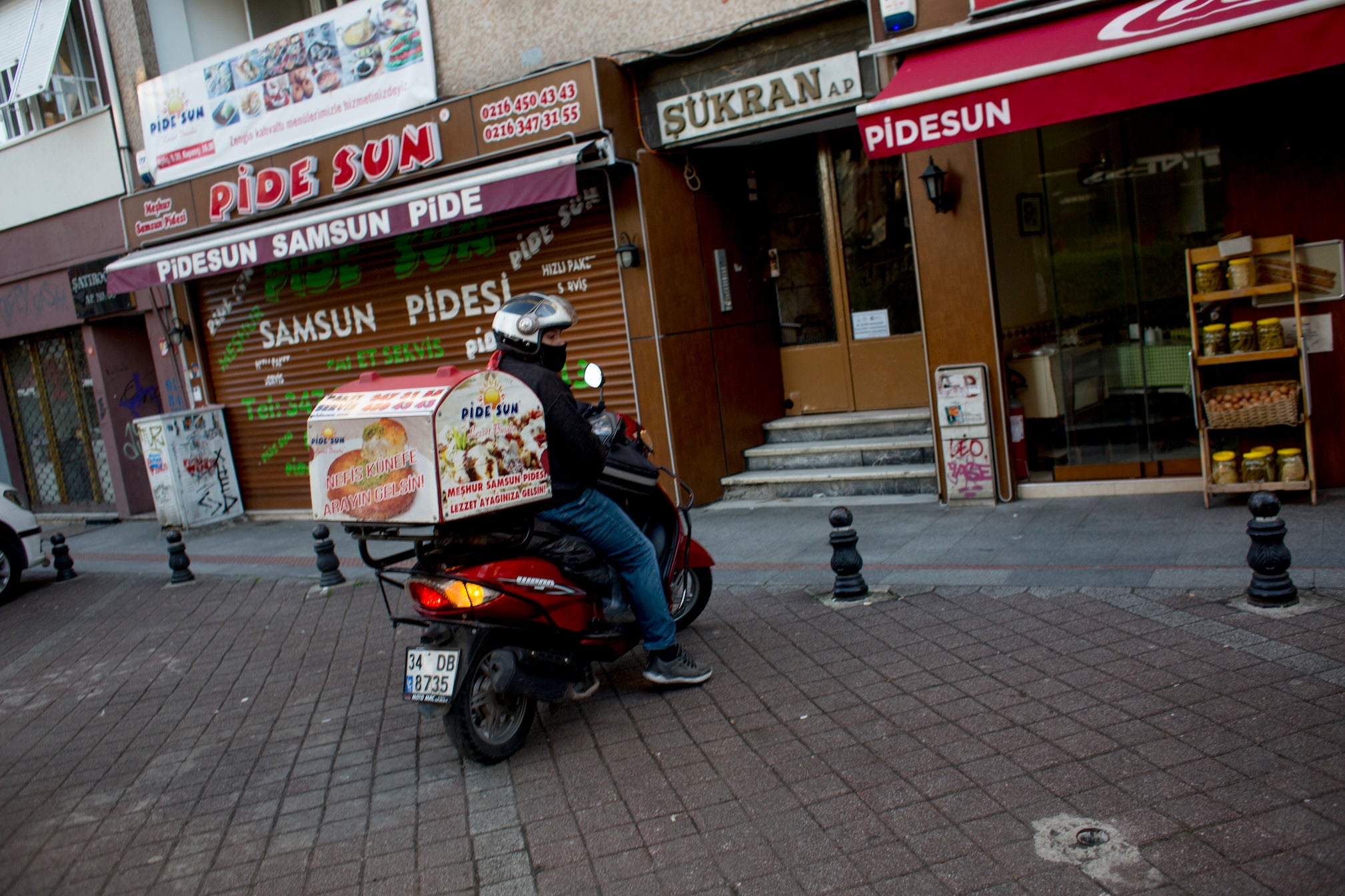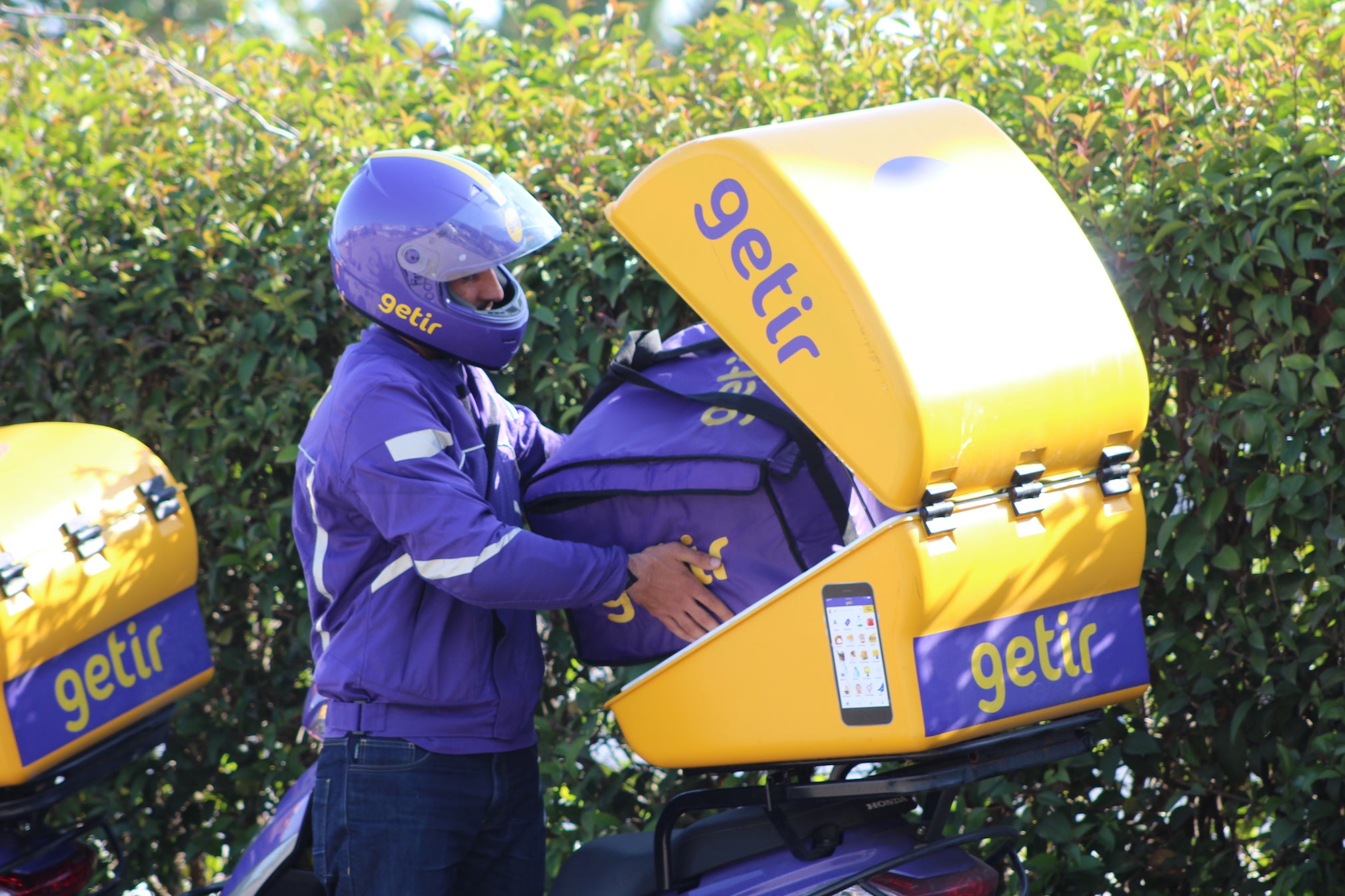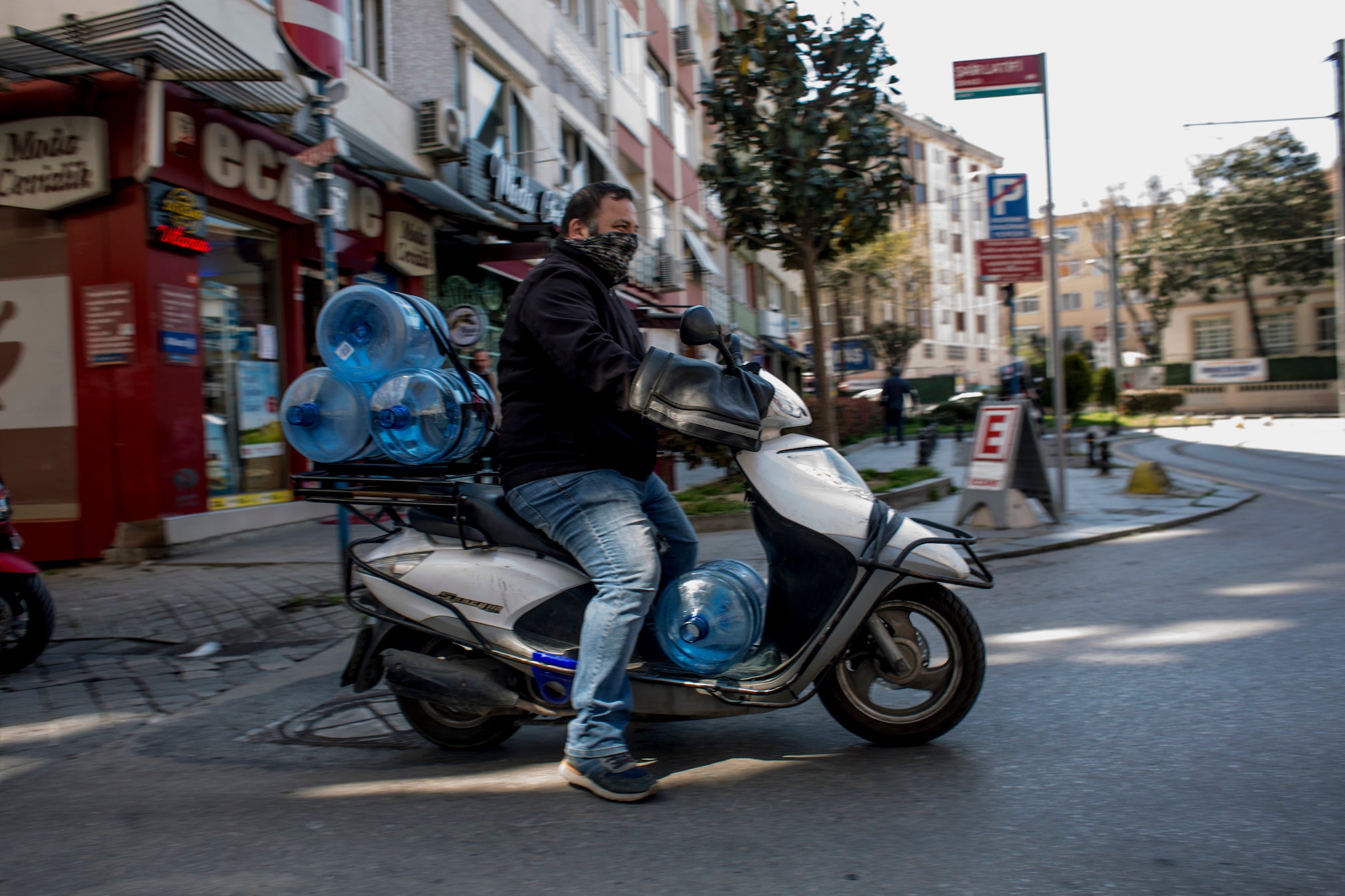‘Everybody’s scared of me’: Delivering food to those in lockdown at home during coronavirus
Fear and low wages mark the lives of delivery guys


Wearing his black face mask and gloves, Ferit Buyuk stacks a pile of pizza boxes into the insulated container on the back of his motor scooter before sliding his helmet on, revving up the engine and zipping out into streets devoid of traffic.
It is dusk, and the normally frenetic streets of Istanbul are mostly empty of pedestrians. Grocery stores will shutter within an hour, leaving delivery people like the 41-year-old and a small army of men the only way those confined to their homes under a strict coronavirus curfew the only source of food.
He approaches each apartment block cautiously, sizing up the building as he buzzes up, walking up the stairs with a stack of Turkish-style pizzas called pide, done up in the style of the Black Sea region around the city of Samsun from which he hails. Occasionally a customer greets him from behind a door, usually with their faces covered. Often he’s asked to just leave the pide at the door, and pick up money set on a chair or table.
He is careful not to touch anything, lest he pick up the coronavirus and bring it to other customers, coworkers, or his wife and two children back home.
“No one would recommend this job at the moment,” he says during a break. “Sales are low, and people are scared and paranoid. Just as people are afraid to walk in the street, we’re afraid too.”

Amid a global pandemic of Covid-19, which has killed nearly 200,000 people and infected at least 2.7 million, those who can, shelter inside their homes. People avoid work, meetings with relatives and even walks outside, as various curfews strictly confine people to their homes or discourage them from making their way outside. Celebrities and social media influencers have made an art out of staying home, assembling videos showing themselves basking in luxurious settings.
But supporting such luxury lockdowns worldwide are armies of delivery persons on foot, bicycles, motorcycles or in cars and trucks toiling away, often risking their own health to bring people both the basics of sustenance such as water and groceries as well as luxury splurges such as sushi or pizzas.
Motorcycle deliveries were crucial to keeping lockdowns in place in China’s Wuhan province, where the pandemic began. Delivery services are playing a key role in keeping people at home in Muslim countries while they prepare an elaborate end-of-day for Ramadan, a month of fasting from dawn till dusk.
Many retailers themselves prefer their customers to stay put, make phone or internet orders and let couriers deliver any goods.
“My customers and I prefer to not see each other in the supermarket,” Shahin Daryani, a store owner in Tehran, says. “If they stay at home, it could be great, even for me. No contact, no virus outbreak.”
But for the drivers, the risks are high. In one district of India’s New Delhi, 72 families and 16 employees of a pizza chain were ordered into quarantine after a delivery boy tested positive for Covid-19. Stress and fear have become so prevalent among delivery guys in South Korea that companies are providing drivers with counselling services.
In Istanbul, a city of 16 million that traverses both Asia and Europe, phalanxes of young men on scooters allow people to stay at their homes. Two large companies dominate the delivery business. Yemeksepeti, which partners with restaurants to bring meals to people’s homes in 69 cities, and Getir, which delivers food and groceries in Istanbul and four other cities.

Since Turkey first took steps to constrict public life, the number of people downloading the Getir app has jumped 60 per cent and business volume rose 65 per cent with increased orders for bottled water, pasta, beans, canned foods, flour, soap and the high-ethanol traditional cologne that Turks use as a hand sanitiser.
While many other companies are planning redundancies and salary cuts, Getir is hiring.
“We feel a responsibility and we plan to expand our work within the framework of this responsibility,” said a statement by the company to The Independent.
But the ramping is putting much of the burden on low-paid and low-skilled workers, who are now considered among the most essential workers in a world struggling through the pandemic. They often find themselves reshaping their lives to meet the demands of their job. For weeks, Sercan Gozacik has been living in a small room next to the restaurant where he serves as the delivery guy in the Karakoy district of Istanbul, staying away from a home he shares with his elderly parents for fear he will bring the virus to them.
Occasionally he encounters customers who appreciate his sacrifices and tip well, or at least greet him warmly. Too often he’s ignored. Once he rode five miles in the rain to deliver a huge pile of food to a hotel. The man had left him a tip of three Turkish lira, the equivalent of 40 pence. Working nearly seven days a week, Gozacik earns about £300 per month.
“My parents are old and my siblings are students, so I have to work,” says the 32-year-old.

Soner Turoglu, 42, delivers large bottles of drinking water to homes around the city. Customers pay online, leave empty bottles and perhaps small tips outside their doors. He earns as little as £233 per month, and had to send his parents, who cared for his child at home, to live with his sister-in-law for fear they would come down with the coronavirus because of his job.
“I am afraid, but I have to pay my rent,” he says.
Getir says it has increased safety protocols to protect drivers and customers, regularly disinfecting warehouses shelves and packing areas. According to the company, motorcycles and vehicles are cleaned and disinfected regularly, delivery areas are washed frequently with soapy water.
“All our warehouse workers and couriers wear masks, regularly wash their hands and use disinfectant before and after preparing and delivering orders,” said the company, which declined The Independent’s request to visit a warehouse or speak with one of its 4,500 drivers.
But delivery guys say friends, family and neighbours are all slightly fearful when they find out their profession – worried they could serve as super-spreaders, bringing the virus to their area. “Everybody’s scared of me,” says Buyuk. “They say, ‘He goes out and will get it and give it to us’.”
Still, beyond the £350 a month he earns to support his wife and two children, he says he finds pride in what he does. The Samsun-style pide that his restaurant, Pidesun, makes includes appetising ingredients imported from the countryside, including pickles and sausages from the Black Sea region. Many of the customers are over 65, barred from leaving their homes under Turkey’s strict rules unless they are heading to doctor’s appointments.
Along with tips, some customers leave him notes of appreciation, apologising for not opening the door and greeting him. Some who do open the door, offer him hand sanitiser as a gesture of kindness.
He cracks a smile when a pair of journalists suggest he’s a hero for bringing food to people living under lockdown.
“Of course, it is an honour to help the people,” he says. “Especially the elderly people, those with disabilities, and those too sick to leave the house.”
Join our commenting forum
Join thought-provoking conversations, follow other Independent readers and see their replies
Comments